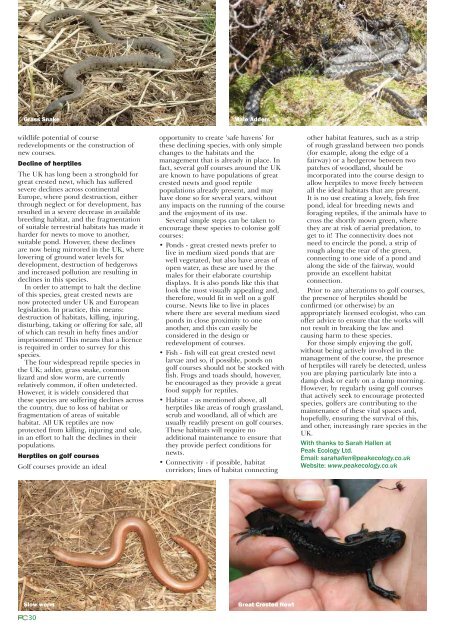Marshalling his troops - Pitchcare
Marshalling his troops - Pitchcare
Marshalling his troops - Pitchcare
Create successful ePaper yourself
Turn your PDF publications into a flip-book with our unique Google optimized e-Paper software.
Grass Snake Male Adders<br />
wildlife potential of course<br />
redevelopments or the construction of<br />
new courses.<br />
Decline of herptiles<br />
The UK has long been a stronghold for<br />
great crested newt, which has suffered<br />
severe declines across continental<br />
Europe, where pond destruction, either<br />
through neglect or for development, has<br />
resulted in a severe decrease in available<br />
breeding habitat, and the fragmentation<br />
of suitable terrestrial habitats has made it<br />
harder for newts to move to another,<br />
suitable pond. However, these declines<br />
are now being mirrored in the UK, where<br />
lowering of ground water levels for<br />
development, destruction of hedgerows<br />
and increased pollution are resulting in<br />
declines in t<strong>his</strong> species.<br />
In order to attempt to halt the decline<br />
of t<strong>his</strong> species, great crested newts are<br />
now protected under UK and European<br />
legislation. In practice, t<strong>his</strong> means:<br />
destruction of habitats, killing, injuring,<br />
disturbing, taking or offering for sale, all<br />
of which can result in hefty fines and/or<br />
imprisonment! T<strong>his</strong> means that a licence<br />
is required in order to survey for t<strong>his</strong><br />
species.<br />
The four widespread reptile species in<br />
the UK; adder, grass snake, common<br />
lizard and slow worm, are currently<br />
relatively common, if often undetected.<br />
However, it is widely considered that<br />
these species are suffering declines across<br />
the country, due to loss of habitat or<br />
fragmentation of areas of suitable<br />
habitat. All UK reptiles are now<br />
protected from killing, injuring and sale,<br />
in an effort to halt the declines in their<br />
populations.<br />
Herptiles on golf courses<br />
Golf courses provide an ideal<br />
Slow worm Great Crested Newt<br />
30<br />
opportunity to create ‘safe havens’ for<br />
these declining species, with only simple<br />
changes to the habitats and the<br />
management that is already in place. In<br />
fact, several golf courses around the UK<br />
are known to have populations of great<br />
crested newts and good reptile<br />
populations already present, and may<br />
have done so for several years, without<br />
any impacts on the running of the course<br />
and the enjoyment of its use.<br />
Several simple steps can be taken to<br />
encourage these species to colonise golf<br />
courses:<br />
• Ponds - great crested newts prefer to<br />
live in medium sized ponds that are<br />
well vegetated, but also have areas of<br />
open water, as these are used by the<br />
males for their elaborate courtship<br />
displays. It is also ponds like t<strong>his</strong> that<br />
look the most visually appealing and,<br />
therefore, would fit in well on a golf<br />
course. Newts like to live in places<br />
where there are several medium sized<br />
ponds in close proximity to one<br />
another, and t<strong>his</strong> can easily be<br />
considered in the design or<br />
redevelopment of courses.<br />
• Fish - fish will eat great crested newt<br />
larvae and so, if possible, ponds on<br />
golf courses should not be stocked with<br />
fish. Frogs and toads should, however,<br />
be encouraged as they provide a great<br />
food supply for reptiles.<br />
• Habitat - as mentioned above, all<br />
herptiles like areas of rough grassland,<br />
scrub and woodland, all of which are<br />
usually readily present on golf courses.<br />
These habitats will require no<br />
additional maintenance to ensure that<br />
they provide perfect conditions for<br />
newts.<br />
• Connectivity - if possible, habitat<br />
corridors; lines of habitat connecting<br />
other habitat features, such as a strip<br />
of rough grassland between two ponds<br />
(for example, along the edge of a<br />
fairway) or a hedgerow between two<br />
patches of woodland, should be<br />
incorporated into the course design to<br />
allow herptiles to move freely between<br />
all the ideal habitats that are present.<br />
It is no use creating a lovely, fish free<br />
pond, ideal for breeding newts and<br />
foraging reptiles, if the animals have to<br />
cross the shortly mown green, where<br />
they are at risk of aerial predation, to<br />
get to it! The connectivity does not<br />
need to encircle the pond, a strip of<br />
rough along the rear of the green,<br />
connecting to one side of a pond and<br />
along the side of the fairway, would<br />
provide an excellent habitat<br />
connection.<br />
Prior to any alterations to golf courses,<br />
the presence of herptiles should be<br />
confirmed (or otherwise) by an<br />
appropriately licensed ecologist, who can<br />
offer advice to ensure that the works will<br />
not result in breaking the law and<br />
causing harm to these species.<br />
For those simply enjoying the golf,<br />
without being actively involved in the<br />
management of the course, the presence<br />
of herptiles will rarely be detected, unless<br />
you are playing particularly late into a<br />
damp dusk or early on a damp morning.<br />
However, by regularly using golf courses<br />
that actively seek to encourage protected<br />
species, golfers are contributing to the<br />
maintenance of these vital spaces and,<br />
hopefully, ensuring the survival of t<strong>his</strong>,<br />
and other, increasingly rare species in the<br />
UK.<br />
With thanks to Sarah Hallen at<br />
Peak Ecology Ltd.<br />
Email: sarahallen@peakecology.co.uk<br />
Website: www.peakecology.co.uk


